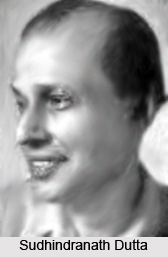 Sudhindranath Dutta was one of the most prominent Bengali poets who rose to fame after the Tagore-era in Bengali literature. In addition to poetry, he had also worked as a journalist, critic and essayist. He had worked with a number of publications which promulgated his philosophies. Born in an affluent family to an eminent lawyer, he had started to chase a career in law but later shifted his focus to the world of literature, leaving his studies midway. He had composed some of the most cherished poetries and essays of Bengali literature.
Sudhindranath Dutta was one of the most prominent Bengali poets who rose to fame after the Tagore-era in Bengali literature. In addition to poetry, he had also worked as a journalist, critic and essayist. He had worked with a number of publications which promulgated his philosophies. Born in an affluent family to an eminent lawyer, he had started to chase a career in law but later shifted his focus to the world of literature, leaving his studies midway. He had composed some of the most cherished poetries and essays of Bengali literature.
Early Life of Sudhindranath Dutta
Sudhindranath Dutta was born on 30th October 1901 in Varanasi to the well known lawyer Hirendranath Dutta and Indumati Vasu Mallik who was the sister of Raja Subodh Chandra Vasu Mallik. He did his schooling initially from Theosophical High School in Varanasi, from the year 1914 and 1917, and later from the Oriental Seminary in Kolkata. He completed his graduation from the Scottish Church College in English. Afterwards he attended the University of Calcutta for Masters in English and simultaneously also studied law at the Law College from 1922 to 1924. However, he completed neither of the courses. Later he started preparing for attorney-ship under his father but once again could not complete it.
Career of Sudhindranath Dutta
In 1931, Sudhindranath Dutta started the publication of a literary magazine with the name Parichay, through which he expressed his philosophy. He continued with the magazine till the year 1943 after which he left owing to the differences in ideologies with his associates. However he continued to provide funds for the same. His association can also be traced with another renowned literary magazine of that period, Sabujpatra. Pramatha Chaudhury, the acclaimed story writer was the editor of this magazine. In the later periods Sudhindranath Dutta worked as a journalist from 1945 to 1949 for The Statesman and was also associated with the daily The Forward for which Netaji Subhash Chandra Bose served as the editor.
While working with the magazines, Sudhindranath Dutta had worked with several companies simultaneously including Light of Asia Insurance Company (1930-1933), ARP (1942-1945), DVC (1949-1954) and Institute of Public Opinion (1954-1956). From the year 1956 to 1957 he worked with the Jadavpur University as a part-time lecturer of comparative literature. He left the job in 1957 and proceeded for his final foreign trip and went on a tour of Japan, Europe and United States of America. In USA he joined University of Chicago for writing his autobiography in English. However, he left the job midway and returned to his homeland to rejoin Jadavpur University. He resumed his job as a lecturer of comparative literature and continued working there till death.
Literary Works of Sudhindranath Dutta
Some of the eminent poetries of Sudhindranath Dutta include Tanvi (1930), Orchestra (1935), Krandashee (1937), Uttar Falgunee (1940), Sangbarto (1953), Pratiddhani (1954) and Dashamee (1956). His noted essays include Svagato (1938) and Kuaye O Kaalpurush (1957).
Personal Life and Death of Sudhindranath Dutta
Sudhindranath Dutta had married Chhabi Basu in the year 1924. He died in the year 1960.



















